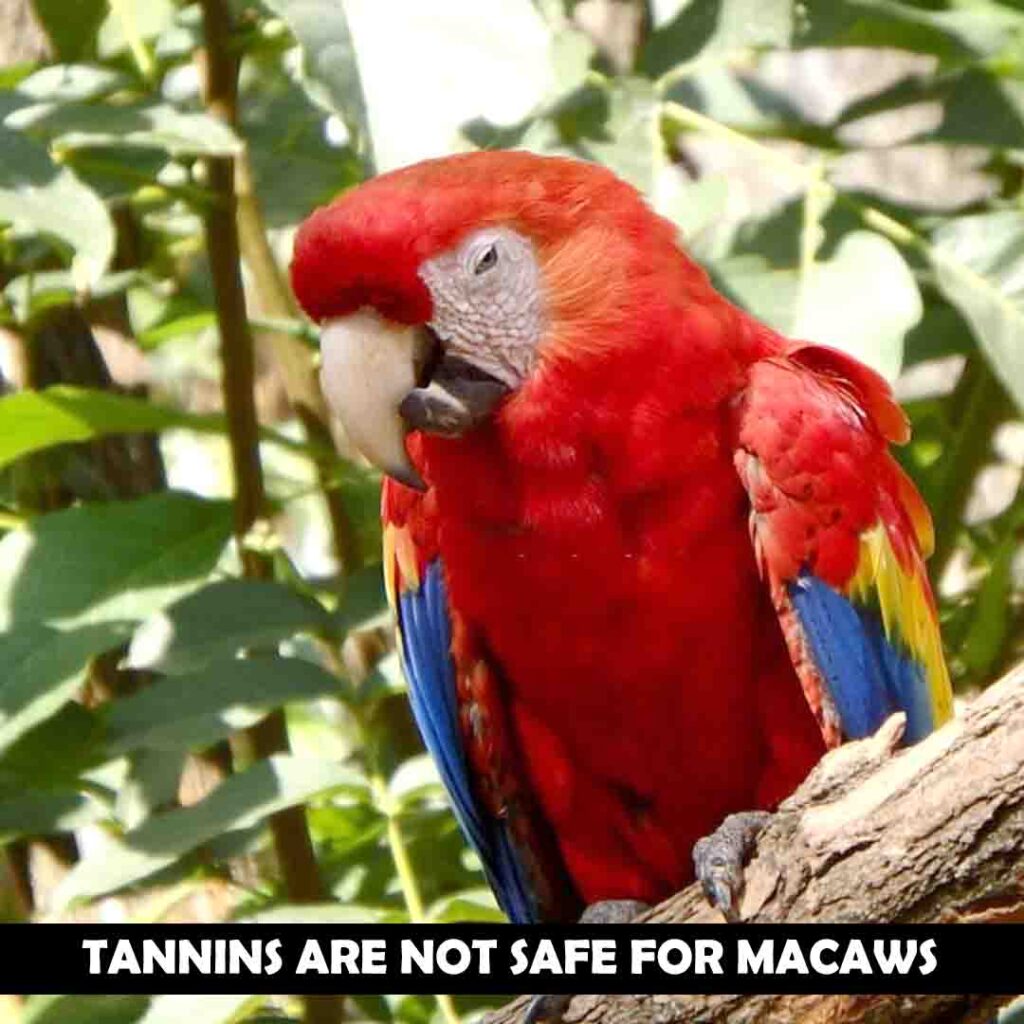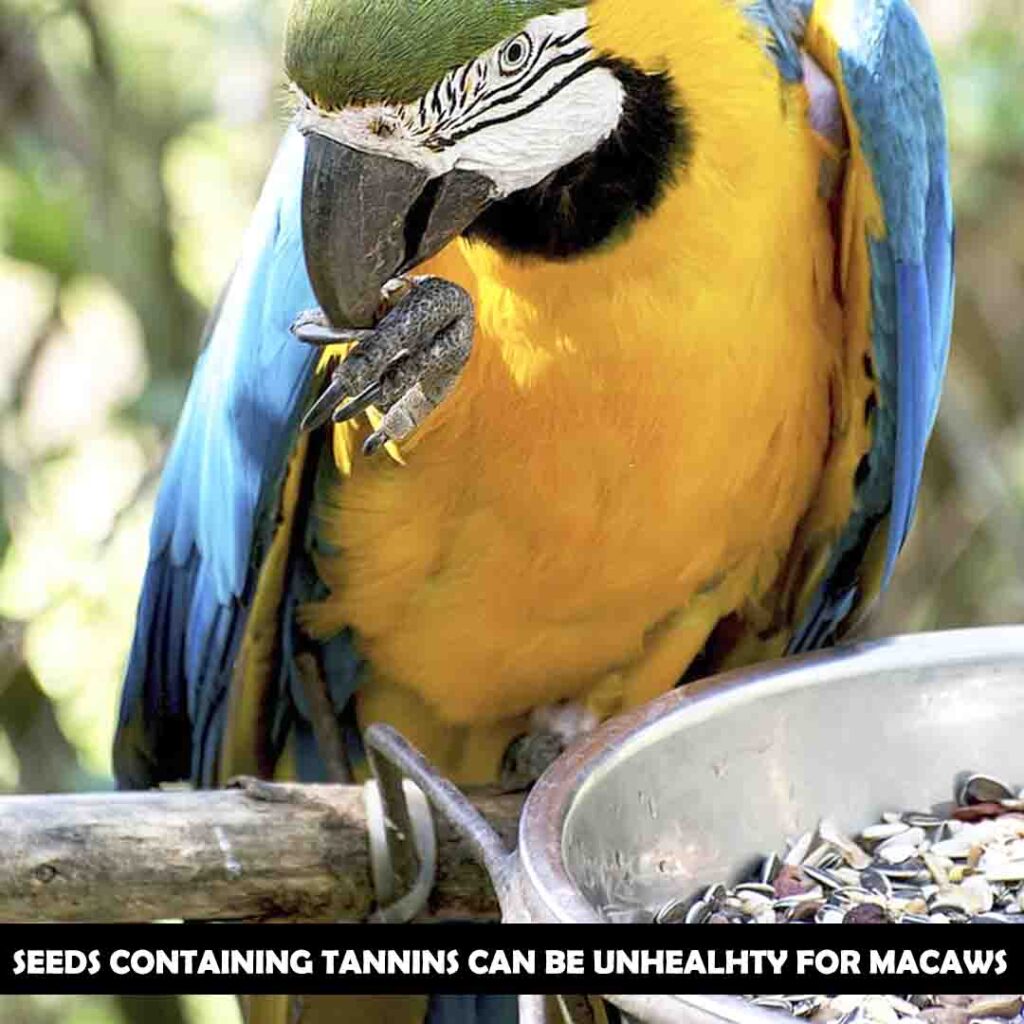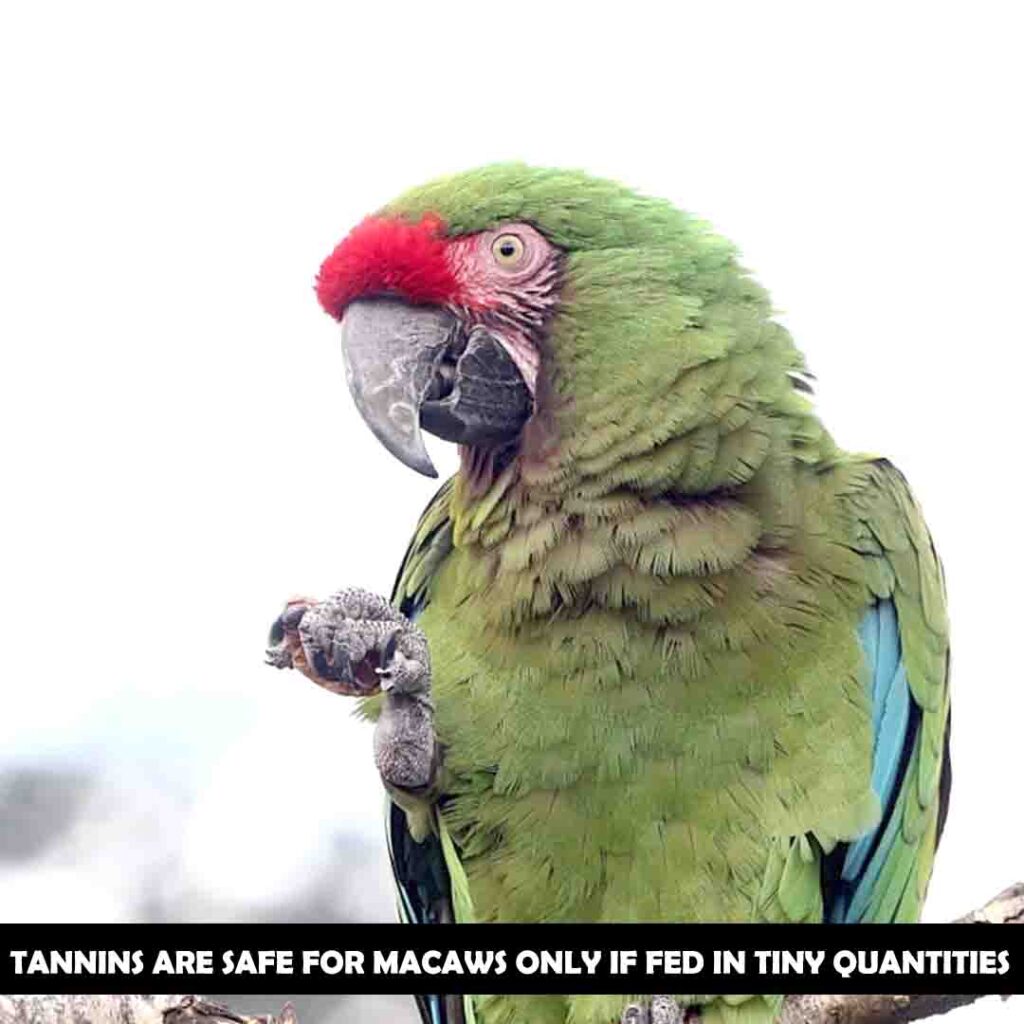Last Updated on February 17, 2022
Macaws can eat most of human foods. Food items derived from plants contain certain chemicals that are not safe for small bodies of macaws. Let’s see if the tannins are safe for macaws or not? From where do they get the tannins?
Tannins are not safe for macaws because they cause severe health issues. So, avoid tea, coffee, wine, chocolate, and oak bark that contain high amount of tannins. Only small amounts of tannins are safe for macaws because they have antioxidants and anti-inflammatory properties.
In this article, you can better understand the role of different levels of tannins in macaws diet. You can also learn the harmful effects of tannins along with their possible benefits. This article can help you find the different food items rich in tannins. You can make better decisions while feeding your macaw.
Tannins are not safe for macaws.
Tannins are not safe for the small bodies of macaws. They can be fatal if consumed in large quantities. They are water-soluble polyphenols that occur naturally in different foods.
In the wild, macaws feed freely on the food they have taught from their parents and flock mates. Sometimes, the macaws eat toxic foods that contain certain chemicals that are not safe for the macaws.
In nature, several other foods can minimize the effect of these toxins in the bodies of macaws. Wild macaws are well adapted to their surroundings and food items that are safe for them.
Tannins bind with the protein and other minerals that stop the absorption of that minerals and decrease macaws’ growth. They also lessen the overall efficiency of the macaws.

Captive macaws eat various types of foods. You must find safer foods that are nutritious and healthy. If you are interested in keeping them growing and healthy, you must be aware of the foods types and feed them healthy foods.
Food items that contain tannins
Different foods contain tannins in more or fewer quantities. Before offering, decide what should be safe for your macaw. The foods rich in tannins are listed below, and small amounts can be toxic.
Tea, coffee, wine, and chocolate
Tea, coffee, wine, and chocolate are dangerous for macaws because of the high concentration of tannins. So, you should avoid all these kinds of foods. Even a tiny quantity of wine and chocolate can disturb the digestibility of macaws and can kill the macaw.
Oak
Oak, leaves, bark, and acorns are toxic to macaws due to their high levels of tannins. Many macaws eat oak leaves and acorns in the wild but do not die. It may confuse you how they survive with tannins.
It may be due to other foods the macaws are feeding along with these acorns. There may be another reason for having a high immunity level and their habit of eating different foods.
Nuts
Macaws eat different nuts in the wild, and many owners offer other seeds and nut mixes to the macaws. You should avoid feeding acorns and oak bark because they are full of tannins.
Some nuts such as pecans, walnut, almond, hazelnut, and peanut contain tannins, so feeding them as the main diet can be toxic. These nuts should be in moderation.

The nuts are full of energy, protein, and fats, and in some stages of life, macaws need this kind of healthy food. That is why you can not wholly avoid the nuts in the macaw’s diet. Use only small amounts occasionally or as a reward during training.
Berries
Macaws can eat berries like strawberries, cranberries, and blueberries. However, the berries are safe due to their nutrition, but they contain tannins, so feeding them as the main diet can harm macaws.
Regular use of berries may hinder the smooth growth of the macaws. That is why occasional use is the best option if you want to get other nutritional benefits of berries.
Herbs, leaves, and legumes
Some herbs, leaves of oak, and legumes contain tannins, so you should altogether avoid them. Many healthy fruits, vegetables, seeds, and nuts are free of tannins. You can use them as a part of macaw’s daily diet.
Every food containing tannins has different types of tannins that function differently. But tannins are not safe and even toxic if consumed in high doses.
Benefits of tannins
Tannins are beneficial only when they are in tiny quantities. You can use foods containing fewer tannins but are rich in other essential nutrients and minerals. For example, pomegranate is very healthy for macaws, containing fewer tannins.
Minimal amounts of tannins in the foods are helpful as they have the following benefits.

- Some tannins act as antioxidants and prevent diseases.
- They are inflammatory and helpful in protecting against chronic infections.
- Accelerate blood clotting and enhance the antibacterial and antifungal properties in macaws.
Harmfull effects of tannins
Tannins are dangerous for all parrots. But certain foods are considered safe for macaws, but they contain tannins. It means the amount of tannins is less, and if you offer this food along with the primary diet of your macaw, it will not harm your macaws.
Some of the harmful effects of having more tannins in the macaws’ diet are:
- Tannins in the macaw’s body can slow down growth by decreasing the feed intake.
- It affects the protein digestion necessary for growth as it affects the feeding efficiency of macaws.
- A high amount of tannins can lead to severe health issues, including stomach, liver, and kidneys damage.
- Tannins can bind with protein and other minerals and reduce their absorption in the blood. Stomach irritation, nausea, and vomiting are the main signs of being sick of excessive tannins.
What should you do if your macaw over-eat tannins?
Sometimes, a macaw overeats the safe foods that contain minimal amounts of tannins. The stomach gets upset and suffers from ulcers because the tannins are bitter and astringent. Restlessness leads to stress and less feed intake. So, the macaws become weak with less immunity.
However, suppose the macaws feed the unsafe foods with high quantities of tannins. In that case, they can suffer from nausea, vomiting, stomach aches, and severely affects the kidneys and liver. If you are sure that macaws have taken the tannins and are not feeling well, get them to the vet for immediate treatment.
Conclusion
Tannins are dangerous for macaws if ingested in higher amounts. Unsafe foods that contain high tannins are chocolate, tea, coffee, wine, oak leaves, acorns, and bark. Avoid feeding these foods to macaws. At the same time, safe foods that include pomegranate, nuts, berries, and some beans can not harm the macaws too much because of their nutritional benefits. Regular feeding may lead to excess tannins that can damage the digestibility of protein and other nutrients and minerals. It is better to avoid foods that contain high amounts of tannins.
Also Read About: Are Papaya Seeds Safe For Macaws?
Bilal is an aviculturist who loves to write in free time. His personal experience with bird care and breeding enables him to share valuable tips. So far, he has contributed more than 100 blogs to this site.
His goal is to promote bird-keeping and save endangered species.
